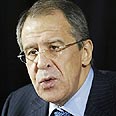
'Russia not ready to back West on Iran'
Moscow supports calls on Iran to renew moratorium on uranium enrichment, but Russian Foreign Minister Lavrov says other means should be considered before referring Iran to U.N. Security Council over its nuclear program
Key European countries have begun work on a resolution that asks member countries of the International Atomic Energy Agency to refer Iran to the Security Council, and the United States is lobbying board members to vote for the measure early next month, a diplomat told The Associated Press.
A draft text that was read to AP by a European diplomat accredited to the Vienna-based UN nuclear watchdog agency stopped short of the calls for sanctions sought by Washington and some of its closest backers.
Instead, it urges the 15-country Security Council to press Tehran "to extend full and prompt co-operation to the agency" in its more than three-year investigation of suspect nuclear activities.
It also asks the council to make clear to Iran "that additional transparency measures are indispensable" if it hopes to prove that it does not intend to make nuclear weapons. The diplomat spoke on condition of anonymity.
Acting Prime Minister Ehud Olmert, meanwhile, warned that Israel cannot allow countries with "hostile intentions" to acquire weapons of mass destruction, a clear reference to Iran, and top Israeli security experts headed to Russia to seek support against suspected Iranian efforts to develop nuclear weapons.
A recent spate of sharp anti-Israeli comments by Iranian President Mahmoud Ahmadinejad have fuelled anxiety over Tehran's nuclear ambitions.
The wording of the draft text of the resolution was likely to change before being submitted to the IAEA's 35-nation board February 2. Still, the fact that it was calling on the council to send Iran's nuclear file back to the IAEA appeared to be the latest indication that Tehran would escape sanctions.
Moscow backs calls on Iran to renew a moratorium on uranium enrichment, a possible pathway to nuclear arms. But asked whether Russia would be ready to refer Iran to the Security Council for violating the Nuclear Nonproliferation Treaty, Foreign Minister Sergey Lavrov argued that other means should be considered first.
China: All relevant sides should remain restrained
"I don't think that the potential of the IAEA's governing board has been exhausted and the European troika has the same opinion," he said, referring to France, Britain and Germany, which have called for the special board meeting to consider referral.
China's Foreign Ministry also took a cautious tone Monday, saying "all relevant sides should remain restrained and stick to solving the Iranian nuclear issue through negotiations."
The Iranian Embassy in Moscow issued a statement calling on the European Union to return to negotiations but warning next month's IAEA session would lead to a new impasse.
"Refusal to hold talks, convening a special session of the IAEA Board of Governors and other methods of applying pressure and threats will not only fail to help settle problems, but will bring the diplomatic process based on mutual understanding and co-operation into deadlock," the statement said.
Lavrov said Iran could not hope to resume talks with the European Union unless it returns to the uranium enrichment moratorium it broke this month.
He said raising the prospect of sanctions was like "putting the cart before the horse."
Both Russia and China are IAEA board opinion leaders whose voice counts with other nations. And both are veto-wielding members of the Security Council that could vote down harsh action against Tehran, including economic sanctions.
Although a key backer of sanctions, the United States has thrown its weight behind the Europeans in hopes that time would work on its behalf in hardening anti-Iran sentiment.
Britain remains convinced Iran should be brought before the Security Council, a senior foreign office official said, speaking on condition of anonymity because of the delicacy of the negotiations.










